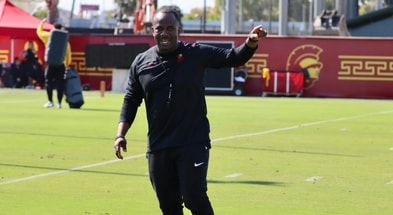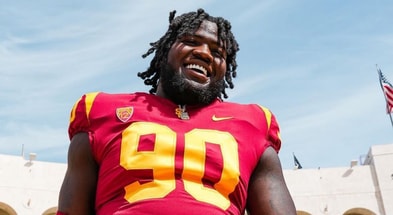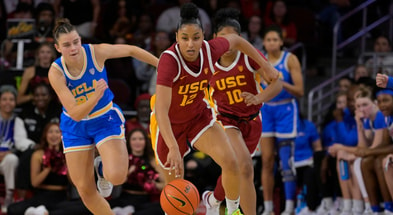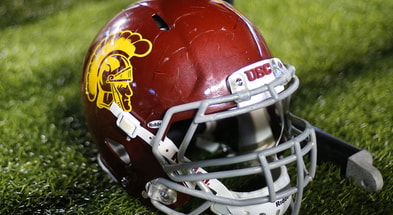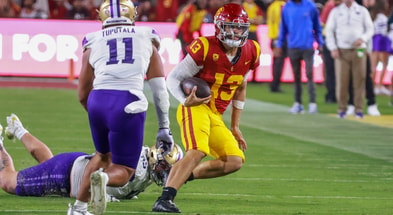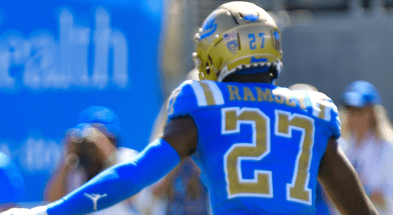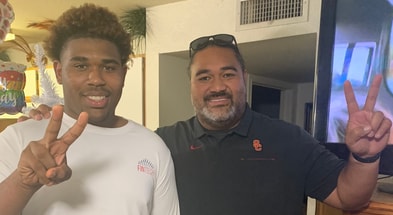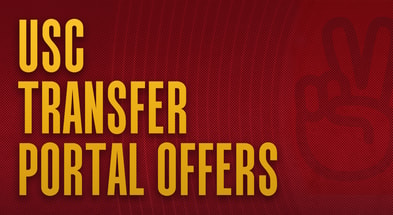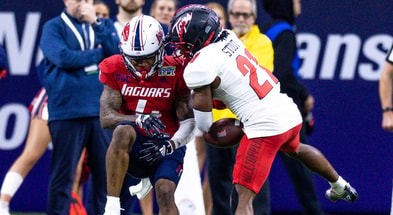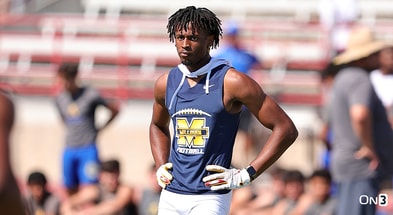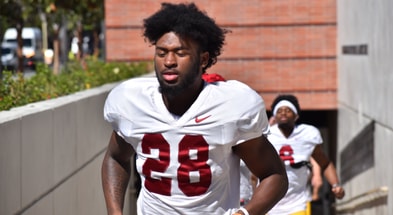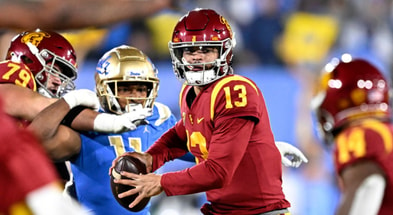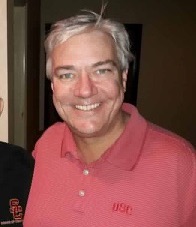Musings from Arledge: Handicapping half the season, UC Davis, and finding long-term success
Greg Katz, always eager to give the people want they want, came out with some preseason predictions that had USC going 2-4 in its first six games. That didn’t go over well with everybody.
I propose we take the emotion out of it and play with a little math, because I think crunching the numbers shows that Katz is not necessarily a Trojan Manchurian candidate, eager for USC to lose just so he can be right for once – although there’s still that possibility! – but in fact that his prognosis is at least one plausible reading of this coming season.
Let’s start by handicapping each of USC’s first six games. I come up with the following:
Fresno State – 90% (chance of a USC win)
Stanford – 55%
BYU – 60%
Utah – 55%
Washington – 40%
Notre Dame – 30%
Now, we can obviously quibble over these numbers. But these are hardly dismissive of USC’s chances. I have USC as slight favorites over Utah and Stanford – those are questionable calls for both are good, tough, well-coached teams – and a favorite on the road against BYU. I have the Trojans as slight underdogs at UW. And the 30% likelihood of winning at ND is probably generous. That is a very difficult place to win. You have to be two touchdowns better than ND to win in South Bend. The officials will make sure of that, even if the weather doesn’t. USC will probably not be two touchdowns better than Notre Dame this year.
So at those percentages, here is what a math whiz (not me, a real math whiz) tells us the probabilities are of USC’s record after six games:
6-0 1.96%
5-1 12.25%
4-2 28.95%
3-3 32.97%
2-4 18.75%
1-5 4.78%
0-6 0.34%
If my handicapping of the individual games is correct, USC has almost a 1 in 4 chance of being 2-4 or worse after six games. That obviously means that USC is likely to be better than that. But things with a 25% chance of happening do, in fact, happen all the time. LeBron James is a career 74% free throw shooter. James is more likely than not to make any free throw he attempts. But it’s not shocking when he misses. He does it all the time. It’s a reasonably likely outcome of any free throw he attempts.
By the way, note that USC has about a 57% chance of being 3-3 or worse. Again, these probabilities change if you tinker with my percentage likelihood that USC will win each of those first six games. But my percentages aren’t crazy; they are at least within a reasonable range. And that means USC struggling to a .500 or sub-.500 record at the halfway point is not at all unlikely.
One final note, back in the Pete Carroll days, when I was a full-time, card-carrying member of the Sunshine Pumpers Club, people would complain that Pete would lose one game a year he shouldn’t have lost. That was frequently true. But crunching the numbers shows just how hard it is to go undefeated, and why even the greats – Urban, Nick, Pete – usually don’t. If a team has a 95% chance of winning every game, it has only a 36% probability of winning 12 straight.
Boy, I can’t wait until that UC Davis game. I bet the Coliseum will be rocking that day. I know, if not UC Davis it would have been a weak D1-FBS team. But why not a weak FBS team? Are we really to believe that nobody would come to the Coliseum for a game? Not Wyoming, not Toledo, not SDSU? That’s just not believable. And maybe it doesn’t matter whether USC plays a weak FBS team rather than an FCS team … but it’s certainly mattered to USC for many years. We’ve been touting our refusal to play anybody but teams in the highest division for as long as I can remember, and now the athletic department decides to scrap all that because … why exactly? If there’s a good explanation, they didn’t offer it.
Paul Dee must be rolling in his grave. He probably took a lot of pride in being the guy who damaged USC football more than anybody else. Now it’s not so clear that he is. With the amount of friendly fire USC football sustains on a regular basis, it’s not obvious to me that our biggest threat really was the “fair-minded folks” at the NCAA. I think it’s the insiders, the administrators who have been tasked with protecting the rich legacy of USC football. They’re the biggest reason USC may soon join Pitt as a former football power that is now nothing more than an afterthought with a collection of dusty trophies .
I’ve explained in prior Musings some of the reasons why I believe USC will be better this year. In light of the schedule, and the significant improvement USC needs to make just to be a good football team after last year’s disaster, this improvement may or may not result in a good record in 2019. I think 9-3 is possible; so is 6-6. I’m tentatively putting my money on 8-4, which is the sort of record that USC teams tend to have when they’re mediocre.
But that’s short term. I want to focus on the long term for a minute. Good programs sometimes have bad seasons; Carroll, Meyer, and Saban have all had down seasons after being well-established at a school. And bad coaches sometimes have good seasons. Karl Dorrell went 10-2; so did Lane Kiffin. Ted Tollner won a Rose Bowl. Gene Chizik won a national title! (Chizik is 24-38 outside of that national championship season.) The sample sizes are too small in college football. The difference between 11-1 and 8-4 can be a handful of plays or one devastating injury. So regardless of what we see this year in terms of record, what must happen for USC to get back to elite status over the long term?
I’m focused on two things. First, the Trojans must develop an identity, the principle that is the very foundation of the program. As Pete Carroll put it, “I’ve hounded my coaches and players about the importance of knowing what you believe and what is most important to you…. It all starts with a very clear direction of where you want to go…. [You must have] an undying belief system and the relentless pursuit of the vision and direction.”
USC doesn’t have that and hasn’t for quite some time. USC football has a slogan: faith, family, football. That’s a fine slogan for recruiting purposes, and it describes an acceptable list of priorities for any player or coach. But that slogan isn’t an identity. Faith, family, football – what kind of football, exactly? What has USC’s identity been the last few years?
Clay Helton said we’d be tough and physical like old-school USC teams. He pointed to Stanford as an example of a program doing what he wanted to do. That clearly wasn’t the case, of course; I don’t think it was ever really the plan, and the move to an Air Raid offense seems to support my skepticism. But if it’s not John McKay or David Shaw-style football, what is this program about? Without knowing your identity — your ultimate aim, you might say — how can you make decisions about anything important? How do you select a strength-and-conditioning program, assistant coaches, schemes? How do you set priorities in recruiting? I know what Wisconsin football is all about. And everything they do is consistent with that philosophy. Some for Wazzu. And Alabama. I know what those programs are all about, even though I don’t follow them nearly as closely as I do USC. I have followed USC very closely, year-round, for many, many years. But I have no idea what this USC football program is all about. I’m hoping that we start to get an answer to that question this season. Until we do, the program is not ready to return to the ranks of the elite.
Second, USC must become a program that anticipates and solves problems quickly. Every season is new; every team is different. The problems that pop up one year may be completely different than the problems that pop up the next. So, yes, a program must solve the problems that dogged it the previous season. This is the bare minimum that a coach should do. Failing to address problems that hurt a team the previous season — like, I don’t know, failing to replace assistant coaches that clearly are not performing at an acceptable level — is the sign of a program that isn’t well led or isn’t serious. But playing whack-a-mole in the offseason where you only address the previous season’s issues isn’t good enough, either. Successful programs anticipate problems, identify them early, and address them quickly.
So why are some of us still skeptical of USC despite the offseason changes? Is it because we want USC to lose? Because we so badly want to be right that we would prefer the football program that we’ve cheered through good times and bad to collapse, so we can pay good money to get embarrassed at Notre Dame Stadium, so what is, for most of us, one of our primary hobbies can be miserable? We want disaster to strike just so we can be right about Clay Helton? That’s absurd. In reality, I want Clay Helton to win every game and publicly call me an idiot for my skeptical columns. That’s what I want.
No, the reason some of us are skeptical is not because of ill motives but because USC hasn’t quickly and decisively identified and resolved problems in a long time. I don’t have to give the full catalogue. Let’s just note that USC had an inferior O line coach, O coordinator, and secondary coach in 2017. They all came back in 2018, despite this liability being patently obvious to everybody — and I mean everybody — who watched USC play, until Clay Helton suddenly decided that everybody else was right and desperately fired or demoted them during a bye week. The move was welcome; the delay was ridiculous. That was not the behavior of a forward-thinking, problem-solving coach.
So it’s a very good thing that USC has upgraded at these positions before the 2019 season. I think we’ll see real benefits from those moves this season. But right now, we have no reason to believe that USC is a program that anticipates and fixes problems quickly, the way successful programs do. And this matters, because the old problems are not necessarily the same as the next set of problems. And the next set of problems will come; they always do. The question is whether USC is a program that can deal with them before the ship takes on too much water. You’ll have to excuse some of us for doubting that USC is that program right now. If it is, it will be a very new and very welcome development.
So to answer a question that occasionally pops up on the message boards about when the skeptics will give Clay Helton credit for success. For me, it’s simple. Win games, yes. But you can win some games and not have established the foundation of a solid program, especially when you have the built-in advantages of a USC. I want to see USC establish an identity such that fans, media, opponents — and most importantly — USC’s players and coaches, know exactly what the program is all about. And I want to see the scheme, practices, recruiting, and other decisions align with that stated philosophy. And, second, I want to see problems dealt with as they arise instead of allowing problems to linger until, like last year, they eventually take down the ship. Do those things, and USC will be set up for long-term success.
And I’ll have to dust off the Sunshine Pumper Club membership card.
